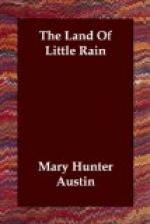The light filtering through the snow walls is blue and ghostly, but serves to show seeds of shrubs and grass, and berries, and the wind-built walls are warm against the wind. It seems that live plants, especially if they are evergreen and growing, give off heat; the snow wall melts earliest from within and hollows to thinness before there is a hint of spring in the air. But you think of these things afterward. Up in the street it has the effect of being done consciously; the buckthorns lean to each other and the drift to them, the little birds run in and out of their appointed ways with the greatest cheerfulness. They give almost no tokens of distress, and even if the winter tries them too much you are not to pity them. You of the house habit can hardly understand the sense of the hills. No doubt the labor of being comfortable gives you an exaggerated opinion of yourself, an exaggerated pain to be set aside. Whether the wild things understand it or not they adapt themselves to its processes with the greater ease. The business that goes on in the street of the mountain is tremendous, world-formative. Here go birds, squirrels, and red deer, children crying small wares and playing in the street, but they do not obstruct its affairs. Summer is their holiday; “Come now,” says the lord of the street, “I have need of a great work and no more playing.”
But they are left borders and breathing-space out of pure kindness. They are not pushed out except by the exigencies of the nobler plan which they accept with a dignity the rest of us have not yet learned.
WATER BORDERS
I like that name the Indians give to the mountain of Lone Pine, and find it pertinent to my subject,—Oppapago, The Weeper. It sits eastward and solitary from the lordliest ranks of the Sierras, and above a range of little, old, blunt hills, and has a bowed, grave aspect as of some woman you might have known, looking out across the grassy barrows of her dead. From twin gray lakes under its noble brow stream down incessant white and tumbling waters. “Mahala all time cry,” said Winnenap’, drawing furrows in his rugged, wrinkled cheeks.
The origin of mountain streams is like the origin of tears, patent to the understanding but mysterious to the sense.
They are always at it, but one so seldom catches them in the act. Here in the valley there is no cessation of waters even in the season when the niggard frost gives them scant leave to run. They make the most of their midday hour, and tinkle all night thinly under the ice. An ear laid to the snow catches a muffled hint of their eternal busyness fifteen or twenty feet under the canon drifts, and long before any appreciable spring thaw, the sagging edges of the snow bridges mark out the place of their running. One who ventures to look for it finds the immediate source of the spring freshets—all the hill fronts furrowed with the reek of melting drifts, all




